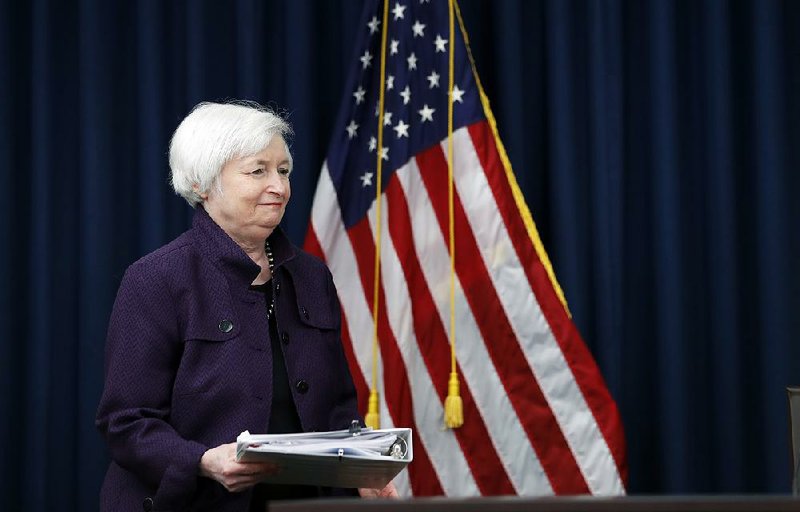WASHINGTON -- The Federal Reserve on Wednesday kept its key interest rate unchanged but signaled that it will likely raise rates before year's end.
The Fed said in a statement ending its latest policy meeting that the U.S. job market has continued to strengthen, and economic activity has picked up. But it noted that business investment remains soft and inflation too low, and that it wants to see further improvement in the job market.
The central bank characterized the near-term risks to its economic outlook as "roughly balanced." It was the first time it has used that wording since late last year, when it most recently raised rates. Most analysts have said they think the Fed will next raise rates in December.
"The statement is much more hawkish than I thought it would be," said Stephen Stanley, chief economist at Amherst Pierpont Securities LLC in New York, who said he expects a rate increase in December. "That just tells you they are revving up the engines."
The Fed said its policy committee had concluded that "the case for an increase in the federal funds rate has strengthened but decided, for the time being, to wait for further evidence of continued progress toward its objectives."
"The Fed appears to be firmly on track for a December hike," Paul Ashworth, chief U.S. economist at Capital Economics, said after the statement was issued.
Stock prices rose in the hour after the Fed issued its statement and during a news conference by Chairman Janet Yellen that laid out her case for holding off on a rate change for now.
In her news conference, Yellen offered a simple explanation for why the Fed didn't raise rates: The economy can still grow without hurting itself.
Yellen said historically low rates haven't caused the economy to overheat as some analysts feared they would. Steady job gains have pulled discouraged workers back into the job market and yet inflation remains below the Fed's 2 percent target rate.
"The economy has a little more room to run than previously thought," Yellen said.
The Fed made clear in updated forecasts it issued Wednesday that it expects growth to remain tepid for the next three years. It expects the economy to expand just 1.8 percent this year and by an almost equally sluggish 2 percent in 2017 and 2018.
The policymakers also forecast that inflation will nearly reach the Fed's target next year before achieving 2 percent in 2018 and 2019. Inflation has remained below that level for more than three years.
For the first time in nearly two years and for the first time since Yellen became Fed chairman in February 2015, there were three dissents to the Fed's statement. The three officials are all presidents of regional Fed banks -- Esther George of Kansas City, Loretta Mester of Cleveland and Eric Rosengren of Boston. All wanted the Fed to raise its key rate at this meeting.
"This seems to have been one of the most divisive FOMC meetings in recent memory," Ashworth said.
The Fed's next meeting is just a week before the November elections, and most analysts think it wouldn't want to raise rates so close to when voters go to the polls. That's why the last meeting of the year in December is seen as the most likely time for the next rate increase as long as the economy keeps improving in line with the Fed's expectations.
The Fed also predicted that it would raise rates more slowly in future years. In a new round of economic projections published Wednesday, Fed officials predicted that the central bank's benchmark rate would rise to 1.9 percent by the end of 2018, well below their March prediction that it would reach 3 percent by the end of 2018.
Until recently, many Fed watchers had thought that a rate increase was likely this week. They believed that the Fed, starting with a late-August speech by Yellen in Jackson Hole, Wyo., was preparing investors for an imminent increase.
Other Fed officials, including Vice Chairman Stanley Fischer, made similar observations, seemingly part of a collective signal that a September rate increase was probable if not definite.
Sentiment shifted, though, after Lael Brainard, a Fed board member and Yellen ally, laid out the case for delaying a resumption of rate increases for now.
Analysts suggested that policymakers who favor a go-slow approach to rate increases, who include Yellen, weren't yet ready to act this week.
Job growth slowed in August. A manufacturing gauge slid back into recession territory. An index that tracks the services economy, where most Americans work, fell to its lowest level since 2010. U.S. shoppers retreated in August to depress retail sales after four straight monthly gains.
And perhaps most critical for some Fed officials, inflation has yet to make significant progress in rising toward the central bank's 2 percent target range.
Information for this article was contributed by Martin Crutsinger of The Associated Press; Jeanna Smialek of Bloomberg News; and Binyamin Appelbaum of The New York Times.
Business on 09/22/2016

